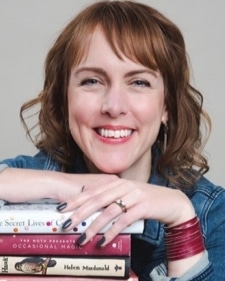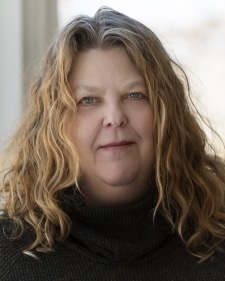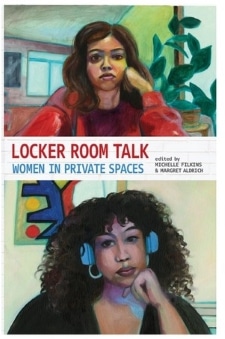Margret Aldrich and Michelle Filkins, editors of Locker Room Talk: Women in Private Spaces
Anthology Category, sponsored by Minnesota Humanities Center
Each week leading up to the 37th annual Minnesota Book Awards, we are featuring exclusive interviews with our finalists. You can also watch the authors in conversation with their fellow category finalists here.



What inspired you to write this book – or inspired you while writing it?
Margret: My co-editor, Michelle Filkins. Michelle had the idea for a collection like this after witnessing two women, near-strangers, have a heartfelt and unguarded conversation in a YMCA locker room. Working on the book with her during the pandemic – even if only over Zoom – was a lifeline to the conversations with women that I was missing.
Michelle: The inspiration for the book was an exchange between two women that I witnessed in a YMCA locker room. Their initial conversation was casual, and then one of the women started to share a painful story about her son. The other woman, wordlessly, came over and hugged her. The first woman was in tears and thanked her and said she hadn’t been able to tell that story to anyone. Shortly after this, the two women separately left the locker room. I thought to myself: THIS is locker room talk! I had been ruminating on this phrase since “locker room talk” reentered the cultural lexicon as a way to rationalize misogyny. The term was associated with a chauvinistic stereotype of what men are like behind closed doors, and that privacy grants permission to be one’s worst self. I knew that what I had witnessed at the Y was extraordinary but that in private spaces women are often their best selves, and demonstrate great care and support for each other. An urgency to capture some of these moments as both a celebration and a call to action sustained my motivation.
What is one detail you wanted to include in this book, but couldn’t find a place for?

Margret: There are many more stories of the way women talk when they’re together – so much so that we could do another volume of Locker Room Talk. One story I’d like to read would be about women in the Indigenous community and their work to bring justice to missing and murdered Indigenous women. Another might be about a women’s book club, the characters in it, and the secrets they keep.
Michelle: Because many of my formative moments happened in actual locker rooms, I expected to see more submissions that were related to sports and the relationships that form as a result of being teammates and competitors. That said, I am grateful for all of the ways that the call for submissions resonated with our authors and for the variety of experiences that are shared. This collection ended up conveying the power of women-centered spaces in ways that exceeded my expectations.
Tell us about someone (whose name isn’t on the cover!) who proved instrumental to the creation of this book.
Margret: Anitra Budd of Colfax Wordsmiths kindly served as copyeditor/proofreader of the final manuscript, and her deft touch was important to the finished book.
Michelle: One of the first people I contacted after I came up with the idea for this project was my friend Anne Aronson. I told her I thought I might be on to something, but I wasn’t sure if it was a viable project. We met up for lunch, and I talked through a few different directions I thought the project could take. Her insights and encouragement proved instrumental in moving from an exciting idea to an actionable plan. I am grateful for her support.
Please tell us something about yourself that is not widely known. (It doesn’t have to be about the book in question – or even about your writing at all!)
Margret: When I worked at Princeton University Press, part of my job was being the gatekeeper for Albert Einstein’s writings, in collaboration with Hebrew University.
Michelle: I have been on several trips to the Boundary Waters Canoe Area. As much as I appreciate living in Minneapolis, there is nothing that compares to the solitude of the woods, or the feeling of accomplishment that portaging a canoe on a muddy trail gives me. There is a liberation in letting go and unplugging for a while that not only promotes the peace of wild things, to quote Wendell Berry, but that also deepens relationships. The level of bonding that happens around a campfire cannot be overstated.
Share your thoughts about the role and value of libraries.
Margret: Libraries are vital to ensuring reading is free – both in monetary terms and philosophical ones. I’m so impressed by the librarians who are standing up for the freedom to read and are pushing back against censorship.
Michelle: I am a librarian, so I have many thoughts. Libraries are essential community assets. As one of the few remaining public spaces open to everyone, they promote literacy, information access, recreation, and belonging. They are places of care and connection that promote healthy communities. In my work, I have helped grade schoolers identify bugs for school assignments, I regularly assist students in literature reviews, I run a community book club, and helped to start a seed library. I was also on a team that planned a community garden and labyrinth that was installed outside my library. Libraries are a third place that adapts to meet community needs.
Margret Aldrich is the author of The Little Free Library Book, recipient of an Innovator Award from the Book Industry Study Group, and former Princeton University Writing Fellow. Margaret is the director of communications and media relations at the Little Free Library nonprofit organization.
Michelle Filkins is a founding editor of Spout Press and a contributing author to The Evolution of Human Cooperation and Community Development. She is a professor and reference and instruction librarian at Metro State University.

